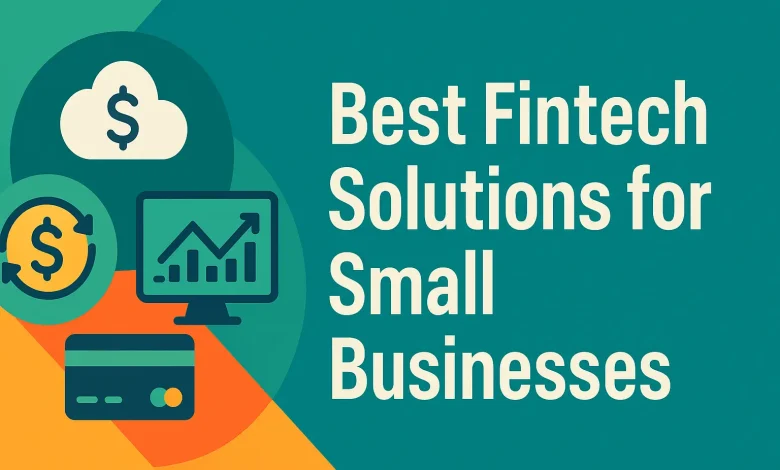7 Best Fintech Solutions for Small Businesses

Audio Playback
In an increasingly digital economy, small businesses face a complex array of financial challenges—from managing cash flow to securing affordable credit and maintaining regulatory compliance. The best fintech solutions for small businesses are transforming these challenges into opportunities by providing scalable, efficient, and tailored financial tools that optimize daily operations and fuel growth.
This comprehensive guide dives deep into the essential fintech innovations reshaping small business finance, revealing how each solution delivers tangible value beyond traditional methods.
1 Best Fintech Payment Solutions for Small Businesses
Efficient revenue capture through flexible digital payment networks has become the backbone for small businesses seeking to accelerate cash flow and enhance customer convenience in a rapidly evolving marketplace.
Platforms such as Stripe, Square, and PayPal have evolved far beyond simple payment processors. They offer multi-channel acceptance, instant fund settlement, and advanced fraud detection, all integrated within user-friendly dashboards.
Key benefits include:
- Seamless integration with both online storefronts and physical points of sale.
- Reduction in transaction delays, improving operational liquidity.
- Advanced analytics to track customer payment behaviors and optimize sales strategies.
2 Cloud-Based Accounting Automation for Small Businesses
Leveraging cloud-powered accounting platforms allows small businesses to transform traditionally cumbersome bookkeeping into a streamlined, error-resistant process that delivers actionable financial insights in real time.
Solutions like QuickBooks Online, Xero, and Zoho Books automate repetitive tasks such as invoicing, expense tracking, and tax calculations. Their cloud architecture ensures data accessibility anytime, from anywhere, while maintaining high security standards.
This automation empowers businesses to:
- Maintain up-to-date financial records with minimal manual effort.
- Generate accurate cash flow reports that inform decision-making.
3 Innovative Fintech Lending Platforms for Small Businesses
Emerging fintech lenders are reshaping small business financing by replacing outdated credit assessments with dynamic data models that unlock capital faster and more fairly.
Unlike traditional banks, platforms like Kabbage, BlueVine, and OnDeck use real-time business data such as bank transactions and invoice histories to evaluate creditworthiness, speeding up loan approvals and disbursing funds within days.
Key advantages include:
- Flexible repayment options aligned with cash flow variability.
- Transparent fee structures that minimize unexpected costs.
- Accessibility for businesses lacking extensive credit history.
4 Expense Management and Smart Budgeting for Small Businesses
Structured expense control, powered by intelligent fintech tools, empowers small businesses to safeguard their working capital and identify cost-saving opportunities often overlooked in manual systems.
Applications such as Expensify, Divvy, and Ramp enable automated receipt capture, real-time expense categorization, and customizable spending policies. These tools integrate seamlessly with accounting platforms, providing a unified financial overview.
Benefits include:
- Enhanced visibility into spending patterns to detect inefficiencies.
- Improved budget adherence through automated alerts and limits.
- Simplified audit trails for compliance and tax purposes.
5 Automated Payroll Solutions for Growing Small Businesses
Automated payroll solutions mitigate the risks associated with manual processes, ensuring timely, compliant, and accurate compensation even as small businesses scale their workforce.
Services such as Gusto, Paychex, and ADP RUN offer comprehensive payroll management, including tax calculations, benefit administration, and employee self-service portals, all within intuitive interfaces.
These platforms help businesses:
- Avoid costly payroll errors and penalties.
- Ensure compliance with evolving tax and labor regulations.
- Streamline onboarding and employee record-keeping.
6 Fintech Banking Platforms Enhancing Small Business Cash Flow
Digital-first banking platforms are enabling small businesses to bypass traditional banking delays, offering seamless access to funds, transparent fees, and integrated financial management.
Platforms such as Novo, Mercury, and Relay offer tailored business accounts with real-time transaction monitoring, virtual cards, and instant fund transfers, eliminating many pain points of legacy banking.
Core features include:
- Low or no fees with clear pricing models.
- Enhanced cash flow visibility through comprehensive dashboards.
- Easy integration with accounting and payment platforms.
7 Cybersecurity and Fraud Protection for Small Business Fintech
In a landscape of increasing cyber threats, tailored fintech security applications provide small businesses with robust defense mechanisms designed specifically for their unique operational constraints.
Security tools like LastPass Business, Sift, and Plaid incorporate end-to-end encryption, access controls, and real-time fraud detection to safeguard sensitive financial data and prevent unauthorized transactions.
Advantages include:
- Protection against data breaches and identity theft.
- Increased customer trust through secure transaction handling.
Conclusion: Prioritize the Best Fintech Solutions for Sustainable Growth
The evolving financial landscape requires small businesses to adopt smarter, technology-driven solutions that enhance efficiency, security, and access to capital. The best fintech solutions for small businesses are no longer optional—they are fundamental enablers of growth and sustainability.
From digital payments and automated accounting to innovative lending and cybersecurity, each fintech innovation addresses critical pain points and unlocks new opportunities. Small business owners who strategically integrate these tools position themselves to compete effectively and thrive in the digital economy.



